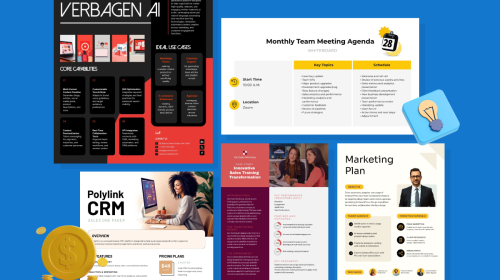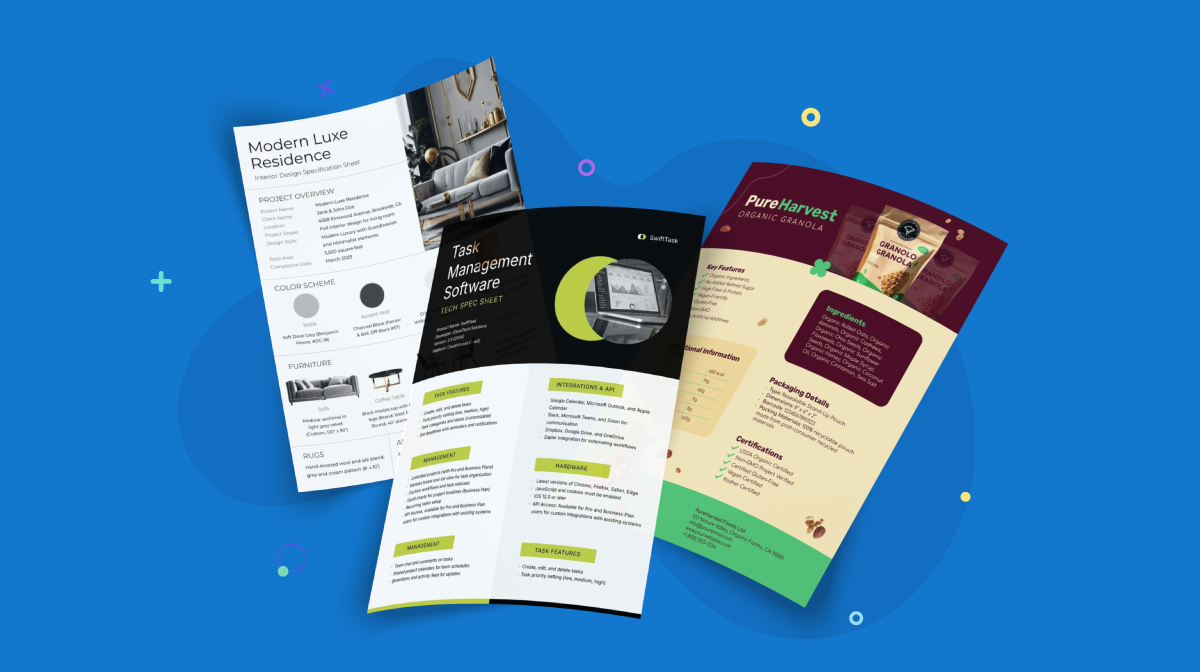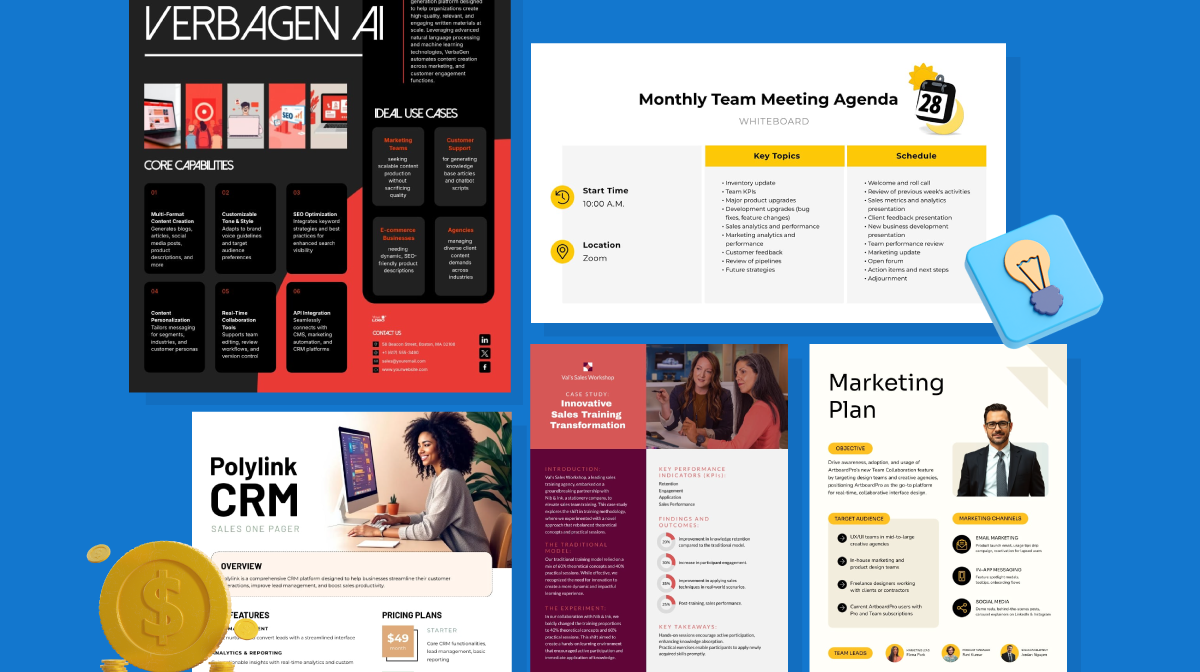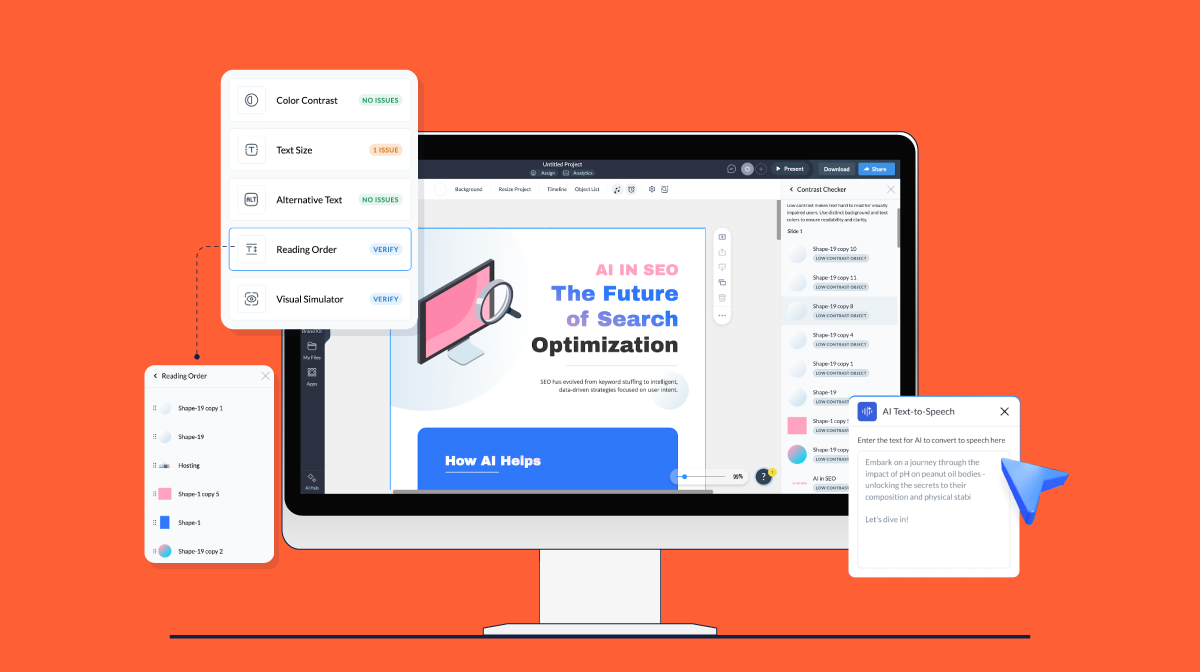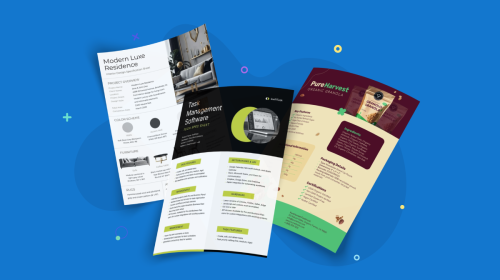
10 Best AI Voice Generators for 2026: Tested & Ranked

AI voice generators have exploded in popularity over the past year. From creators recording podcasts to businesses scaling training videos, everyone’s chasing realistic, flexible and affordable voices.
And if you’ve scrolled through YouTube, Instagram or TikTok lately, you’ve probably noticed just how many videos are narrated with AI voices. The trend is everywhere.
I run a YouTube channel with 7,500+ subscribers, and I’ll be honest, I’ve considered using AI voice generators for my own content too.
That curiosity led me to test several tools first-hand. In this guide, I’ll share my experience with the 10 best AI voice generators of 2026, show you examples of what they can produce and break them down based on audio quality, pricing and ease of use.
And as a bonus, I’ll also show you how to pair AI prompts with an AI voice generator or text-to-speech tool to unlock even better results for your projects.
Let’s get started.
Table of Contents
- What Is an AI Voice Generator?
- How I Tested & Reviewed Each AI Tool
- Best AI Voice Generator Comparison Guide
- 10 Best AI Voice Generator Tools
- Best AI Voice Generators by Use Case
- How to Choose the Right AI Voice Generator
- How to Use AI Prompts for Better Voice Generation
- Best AI Voice Generator FAQs
Best AI Voice Generators of 2026
- Best for business presentations & training: Visme
- Best for ultra-realistic narration: ElevenLabs, Murf
- Best for podcasts, audiobooks & storytelling: ElevenLabs, LOVO, Hume
- Best for corporate L&D & education: Visme, WellSaid Labs, Murf
- Best for social media content: Epidemic Sound, CapCut, Descript Regenerate
*Disclaimer: The comparisons and competitor ratings presented in this article are based on features available as of September 18, 2025. We conduct thorough research and draw on both first-hand experience and reputable sources to provide reliable insights. However, as tools and technologies evolve, we recommend readers verify details and consider additional research to ensure the information meets their specific needs.
What Is an AI Voice Generator?
An AI voice generator is a tool that turns your text to speech using…well, AI.
Think of it as typing a sentence and instantly hearing it read back in a realistic, human-like voice.
Most of these AI voice generators are powered by advanced machine learning models trained on hours and hours of real voice recordings. That’s why they sound so natural compared to the robotic text-to-speech voices we all remember from the early 2000s.
The best tools take it even further. You can clone your own voice, tweak tone and pacing or add emotions like excitement, calmness or urgency. Some even support multiple languages and accents, making them flexible enough for global audiences.
Doesn’t matter who you are—creator, marketer, educator—you can now record professional voiceovers for YouTube videos, TikToks, training modules or ads without ever stepping into a studio. With the right tool, you can go from a plain script to a life-like voiceover in minutes.
Mark Friend, company director at Classroom365, had a similar experience with AI voice generators:
“A voice generator was one of the things that we did when we were just beginning our business, we just created short guiding videos to help teachers who were not available to attend live classes. The voices were well understood and allowed us to complete the guides in a day rather than to hire a voice actor.”
Probably the best part about AI voice generators is that they’re surprisingly accessible. They’re affordable, and in most cases, easy to use. That makes them just as useful for a solo YouTuber experimenting with content as they are for a global brand scaling customer support or training programs across multiple languages.
How I Tested & Reviewed Each AI Tool
To make sure this review is fair and actually useful, I didn’t just read spec sheets; I actually signed up and tested each tool myself. Here’s a quick breakdown of my testing methodology:
- I created at least one project in each tool to test practical use cases like YouTube intros, narrating presentations, adding voiceovers to training content, recording short ads, creating audio for social media videos and even experimenting with podcasts.
- I carefully listened to the voice quality each tool produced: was it clear, natural and believable, or did it still sound robotic?
- I looked at the ease of use: could I go from sign-up to exporting audio without a headache?
- I reviewed the extras (if available). Things like voice types, voice cloning, emotion control, language options and other customizations.
- And of course, I compared pricing: what you actually get for free, what’s locked behind paid plans, and whether the cost feels justified.
I personally went in and tested and reviewed each tool, so this article was written by a human (hi 👋) for humans (that’s you). My goal is to help you cut through the noise and quickly spot which AI voice generator is worth your time.
Best AI Voice Generator Comparison Guide
| Tool | Best For | Top Features | Pricing | G2 Rating |
| Visme | Professional-sounding voiceovers, business presentations, training and onboarding modules, eLearning, marketing assets, video editing, animations and interactivity, collaboration, lead generation etc. | AI Text-to-Speech, AI Writer, AI Presentation Maker, AI Designer, AI Brand Wizard, AI Image Generator, AI Resize | Free; paid starts at $12.25/mo | 4.5/5 (451 reviews) |
| ElevenLabs | Podcasts, audiobooks, hyper-realistic voices | Text-to-Speech, Voice Design, Voice Cloning, Voice Remixing, Conversational AI, Sound Effects, Voice Isolator | Free; paid starts at $5/mo | 4.6/5 (623 reviews) |
| Murf | Training videos, explainer animations, business content | Voice Cloning, Voice Editing Studio, Murf Dub (multilingual dubbing), Murf API, Stock Music/Media Library | Free; paid starts at $19/mo | 4.7/5 (1,392 reviews) |
| WellSaid Labs | Corporate training, eLearning, onboarding modules | 120+ Voices, Custom Pronunciations, Adobe Premiere & Express Integration, Team Workspaces, API | Free; paid starts at $50/mo | 4.7/5 (113 reviews) |
| Epidemic Sound | YouTube & social media creators | AI Voiceovers with Human Enhancement, 20+ Voices, 12 Languages, Mix with Music/SFX Library | Free; paid starts at €5.99/mo | 4.2/5 (24 reviews) |
| Listnr | Podcasters & creators needing fast conversions | 1,000+ Voices, Multi-Voice Conversations, Speech Styles, Voice Inflections, AI Text-to-Video, Voice Cloning, API, Dubbing | Free; paid starts at $19/mo | 4.4/5 (15 reviews) |
| Hume | Conversational AI & emotionally expressive content | Empathic Voice Interface (EVI), Text-to-Speech, Voice Cloning, Voice Design, API | Free; paid starts at $3/mo | - |
| LOVO | Podcasts, audiobooks, storytelling | 500+ Voices, Emotion Control, Multi-Voice Projects, Auto Subtitles, Video Editor, AI Writer, Voice Cloning, AI Art Generator | Free; paid starts at $24/mo | 4.4/5 (180+ reviews) |
| CapCut | TikToks, Reels, short social videos | AI Voiceover (300+ Voices), Voice Transform, AI Writer, AI Captions, Video Editing Suite, Voice Changers, AI Video Maker | Free; paid monthly and annual subscriptions available | - |
| Descript Regenerate | Marketing videos, podcasts, business presentations | Voice Cloning, Regenerate (TTS editing), Audio Effects (EQ, Reverb, Dynamics), Transcription, Screen Recording, Stock Media, Captions | Free; paid starts at $16/mo | 4.6/5 (779 reviews) |
Let’s discuss each tool in detail now:
10 Best AI Voice Generator Tools
1. Visme
Visme isn’t a dedicated AI voice generator like most tools on this list, but what makes it number one for me is that it can do so much more than just generate voices. It sits alongside some of the best AI design tools but it also handles voice generation brilliantly.
Visme is an all-in-one content creation platform that helps you design presentations, training content, marketing assets, social posts, videos and even animated and interactive projects.
It offers 10,000+ built-in templates, advanced collaboration and workflow tools, dynamic fields, tons of sharing and publishing options and much more.

Additionally, it comes equipped with several Visme AI features, including:
- AI Writer to draft scripts, outlines and copy.
- AI Presentation Maker to spin up professional decks in minutes.
- AI Brand Wizard to instantly apply your brand fonts, colors and logos.
- AI Image Generator for custom visuals.
- AI Resize to adapt your content across different formats.
- And of course, the AI text-to-speech tool.
To test it, I opened up a presentation I had just created with Visme’s AI Presentation Maker. I decided to add a background narration to one of the main slides: Why Partner with FoodSync (a food delivery app).
All I had to do was click on the AI Hub → AI Text to Speech. It’s straightforward to use:
Step #1: Paste in my script
“So, why partner with FoodSync?
- We provide expanded coverage in high-demand areas.
- Safety-first operations with vetted couriers.
- Lower cost per order through dynamic routing.
- And reliable ETAs, even during peak hours and bad weather.
Partner with FoodSync, and let’s deliver smarter, faster and safer.”
Step #2: Choose a voice
Nova. I love this the most, but you can play around with other options.
Step #3: Add voice instructions
- Accent: Neutral American English
- Speed: Medium pace (not rushed, but energetic).
- Tone/Style: Professional, confident and upbeat.
- Intonation: Slight emphasis on benefit words like “expanded coverage,” “safety-first” and “reliable ETAs.”
Note: This step really sets your narration apart from generic ones. You can adjust pace, tone or emphasis here.

Here’s what it generated:
The overall results of Visme’s AI text-to-speech generator were brilliant. The voice was life-like, clear, and added a nice touch to my project. And the best part is that you can do the same with any type of content.
Say, for example, I have an Instagram post about an upcoming sale. I can generate a narration right inside Visme, export it as a video, or even use Visme’s built-in social media scheduler to publish it directly. Love it.

To add audio to your Visme project, click on the Audio icon → Audio Library, and select the file. Simple.
The biggest upside is that the voice generator comes built right into the same workspace where I’m already creating. No jumping between multiple apps, no extra subscriptions. That saves me time and money.
And since Visme supports SCORM and xAPI, I can even export narrated presentations for an LMS or training platform; something you won’t get in most standalone voice tools.

Visme’s AI text-to-speech tool is one of those features you don’t realize you need until you start using it. It delivers natural, life-like narrations that are incredibly useful for a wide range of projects. And when you pair this quality with Visme’s other AI features, built-in analytics tools and a dedicated library of icons, data widgets and stock images, it’s easy to see why Visme ranks #1 on my list.
Pricing
- Basic: $0
- Starter: $12.25/mo
- Pro: $24.75/mo
- Enterprise: Contact for pricing
2. ElevenLabs
ElevenLabs is one of the most talked-about AI voice generators on the market, and for good reason.
It’s built specifically for ultra-realistic voice synthesis, and the quality honestly blew me away. If you’ve ever come across those hyper-natural TikTok narrations or YouTube explainers that make you question whether it’s AI, that’s often ElevenLabs.
What sets it apart is its ability to handle long-form narration without losing consistency. This makes it a favorite for audiobooks and podcasts.
Speaking of podcasts, to test ElevenLabs’ text-to-speech features, I gave it a script for a podcast intro. Here’s what I used:
“Welcome to The Future of Business, the show where we unpack the latest trends shaping the way companies grow, adapt, and thrive. I’m your host, and today we’re diving into eco-friendly packaging—a topic that’s reshaping supply chains and consumer choices alike.
Joining me is Sarah Law, founder of GreenWrap Solutions, who’s here to share how sustainable packaging isn’t just good for the planet, but also for businesses. Stay tuned as we explore what’s changing, what’s working, and how brands can make the switch without breaking the bank.”
Here’s what it generated:
The result sounded incredibly natural, with consistent pacing and intonation across both paragraphs, something a lot of other tools struggle with in longer recordings.
You can also fine-tune your AI-generated voice with settings like speed, stability, similarity and style exaggeration. ElevenLabs even gives you multiple model options, including Eleven Multilingual v2 and Eleven v3 (alpha) for the latest advancements.
Other than text-to-speech, ElevenLabs comes with a packed library of sound effects, and you can even create your own custom ones.

If you already have audio and want to clean it up, the voice isolator feature helps you separate vocals from background noise. There’s also a voice changer where you can upload audio or video files and instantly convert them into a different voice style.
Beyond that, ElevenLabs has some very advanced capabilities:
- Voice design: create a unique AI voice using just a prompt.
- Voice cloning: replicate your own or someone else’s voice (with consent).
- Voice remixing: blend voices for unique results.
- Conversational AI: build custom voice agents for interactive experiences.
Overall, ElevenLabs isn’t just a text-to-speech tool; it’s a full voice generation platform. From ultra-realistic narration to sound effects and voice cloning, it’s one of the most powerful options on the market. If you need professional-grade voices for podcasts, audiobooks or branded content, it’s hard to beat.
Pricing
- Free
- Starter: $5/mo
- Creator: $11/mo
- Pro: $99/mo
- Scale: $330/mo
- Business: $1,320/mo
- Enterprise: Contact for pricing
3. Murf
Murf is another popular AI voice generator I tested as part of my research. It leans more toward professional use cases like training videos, explainer animations, ads and even internal presentations.
Just like ElevenLabs, Murf is more than just a voice generator; it’s a full voice studio where you can edit scripts, sync audio with visuals and even collaborate with teammates.
To test Murf, I gave it a simple training-style script, something you’d expect in an onboarding presentation:
“Welcome to your first day at Brightline Inc. In this training, we’ll cover workplace safety, reporting guidelines, and our commitment to creating a safe environment for everyone. Please follow along with the slides, and don’t hesitate to pause if you need more time.”
Here’s what it generated:
The narration came out smooth and professional, especially with the voice “Charles (M).” Some of the other voices did sound a bit robotic to me, but Murf offers plenty of options, so it’s worth playing around until you find one that fits your style.
You can also tweak things like pitch, speed, pauses and pronunciation. There are multiple languages and voice styles to pick from: conversational, inspirational, angry etc. Plus, Murf lets you break scripts into blocks, which is a nice touch for longer projects.
On top of that, Murf includes a library of stock music, images and videos that you can drop into your projects, making it feel more like a mini-production studio.

Other notable features include:
- Voice cloning (available on higher tiers).
- Voice editing studio for syncing narration with video or slides.
- Murf Dub for automatic dubbing into multiple languages.
- Murf API if you want to integrate it into your own workflows.
Overall, Murf might not be the most realistic AI voice generator compared to ElevenLabs, but it’s one of the most practical for business. Between its voice studio, dubbing features and stock media library, it’s a solid option if you want more than just a voice.
Pricing
- Free
- Creator: $19/mo
- Business: $66/mo
- Enterprise: Contact for pricing
4. WellSaid Labs
Next up on my list is WellSaid Labs—another popular name in the AI voice generation space.
It’s known for its studio-quality voices across several use cases like explainer videos, eLearning modules, internal training and corporate communications.
To put WellSaid to the test, I gave it a script you’d typically hear in an onboarding eLearning module:
“Welcome to our workplace safety course. In this module, you’ll learn how to identify potential hazards, report safety concerns and respond in case of emergencies. Keeping our workplace safe is everyone’s responsibility.”
Throughout this training, you’ll find real-world scenarios and quick quizzes to check your knowledge. By the end, you’ll know how to apply safety practices that protect you, your colleagues and our customers every single day.”
Here’s what it generated:
The narration was clean and surprisingly natural-sounding. AI really has come a long way; this could easily pass as a professional voice actor recording.
WellSaid Labs gives you 120+ voices to choose from, plus the ability to fine-tune pronunciations for tricky words or brand names. You can record a single take, render by paragraph, or render by sentence, which comes in handy for longer projects.

It also supports direct integrations with Adobe Premiere and Adobe Express, making it easier to drop narration right into your video editing workflow.
On the collaboration side, WellSaid offers folders and team workspaces, though these features are only available in premium plans. For developers and enterprise teams, there’s also an API to scale content production.
Overall, WellSaid Labs is best if you need professional-grade voiceovers for training, onboarding or enterprise communications. It’s not the cheapest option, but the quality and consistency make it a strong contender for businesses that need professional-sounding narration at scale.
Pricing
- Free
- Creative: $50/mo
- Business: $160/mo
- Enterprise: Contact for pricing
5. Epidemic Sound
Epidemic Sound has always been a big name in the music and sound effects space for social creators, but they’ve recently stepped into the AI voice generation world with their new feature called Voices.
The idea here is simple: On top of your background tracks and sound effects, you also get to create AI voiceovers, making Epidemic Sound a true one-stop shop for audio production.
The difference here is that instead of purely synthetic voices, they use human voiceovers enhanced by AI. You can generate natural narrations right inside the platform and seamlessly mix them with music or effects from Epidemic’s huge audio library.
To test it out, I used a YouTube-style script for a product review:
“In today’s video, we’re checking out the latest smart home gadget that promises to save you time and money. I’ll walk you through the features, show you how it works, and share my honest take on whether it’s worth the hype.”
Here’s what it generated:
The output was smooth and carried that creator-friendly tone that works perfectly for YouTube and social videos.
You can toggle between 12 language options (including Spanish, Japanese, German, French and Russian) and about 20 different voices. Plus, there’s a neat feature where you can record your own reading in English to help control tone and delivery, which makes the final narration feel more personal.

I also like how straightforward Epidemic Sound has made the workflow. You create a voiceover, layer it with background music or sound effects and export it. No fuss.
Overall, Epidemic Sound’s Voices might not be as advanced or feature-packed as some of the other tools on our list, but for social creators and YouTubers, it’s a fantastic all-in-one solution. If you’re already using Epidemic for music, the AI voice generator is an extra tool that adds real value without complicating your setup.
Pricing
- Free
- Creator: €5.99/mo
- Pro: €11.99/mo
- Enterprise: Contact for pricing
6. Listnr
Next, I tried Listnr—a lightweight tool that’s clearly built with creators, podcasters and marketers in mind. They advertise 1,000+ AI voices in 142+ languages and pitch themselves for a wide range of use cases like social media content, narration, audiobooks, conversational AI, eLearning, podcasting and even gaming.
To test it, I wanted to see how it would perform for an audiobook-style narration. I even wrote a small script, but then I hit a wall: the platform only allows 100 characters. That’s shorter than a meta description. I tried anyway and entered a single line (around 20 words), but then it told me I couldn’t test premium voices.

Fair enough, I guess, but the problem was that there weren’t any non-premium voices available to try.
I figured maybe this was an issue with their new version, so I switched to their older interface. This time, I did see a list of non-premium voices, but again, I wasn’t able to test a single one.

At this point, I searched online to see if others had run into the same problem, and I came across this G2 review:
“I have been using Listnr AI's TTS functionality for around 18 months and the platform is plagued by constant outages, some which have lasted several days. This often leads to missed video deadlines and a general lack of trust that the product will work when I need it to.”
This echoed my own experience. It wasn’t so much about voice quality, but about the tool not working at all.
Since I couldn’t test Listnr firsthand, let’s look at what it claims to offer instead:
- New Voiceover Editor: Write or paste a script directly in-app.
- Upload PDFs: Convert entire documents into audio.
- Use URLs: Paste a blog post link and instantly turn it into a narration.
With fine control over voiceovers through:
- Speech Styles: Add expressive tones.
- Multi-Voice Feature: Create conversations in one audio file.
- Custom Pronunciations: Define and save brand-specific words.
- Voice Inflections: Adjust pitch, speed, and pauses.
- Preview Mode: Listen before rendering.
And extras like:
- AI Text to Video Generator: Turn text into short-form videos for YouTube, TikTok, or Instagram.
- AI Voice Cloning: Clone your own voice in seconds.
- Text-to-Speech API: Integrate TTS into apps or workflows.
- AI Dubbing: Automatically dub videos into other languages.
On paper, Listnr looks promising with features tailored to creators and podcasters. But based on my own testing (or lack of it), I’d say reliability is the big question mark here. If you can’t actually test or trust the platform, the features don’t mean much.
For now, I’d be cautious about depending on Listnr for professional work, especially when other tools on this list deliver both stability and quality.
Pricing
- Free
- Individual: $19/mo
- Solo: $39/mo
- Agency: $99/mo
7. Hume
Hume is a newer player in the AI voice generator space, and what sets it apart is its focus on emotionally expressive AI voices.
Instead of just reading text in a flat, robotic way, Hume uses an Empathic Voice Interface (EVI) that can recognize emotional cues and respond with the right tone. That makes it especially interesting for conversational AI, customer experience and interactive applications.

To test Hume, I wrote a short script you’d expect from a customer support interaction:
“Hi there, I see you’re having trouble setting up your account. Don’t worry—we’ll get this fixed together. Can you tell me the exact error message you’re seeing?”
“Thanks for sharing that. Let’s walk through the steps slowly, and I’ll guide you so you won’t feel stuck again.”
Here’s what it generated:
The output was surprisingly human-like, and honestly, I was really happy with the results.
Hume also lets you “enhance text” to match the voice character you’ve selected. When I clicked enhance, here’s how it changed my script:
“Howdy, partner. I see you're havin' a bit of trouble settin' up your account there. Don't you fret, we'll get this fixed up together, alright? Can you tell me the exact error message you're seein'?”
“Well, thanks for sharin' that with me. Let's walk through these steps nice and slow, and I'll guide you so you won't feel stuck again.”
The text changes based on the character, giving each voice its own nuance and personality. It’s a clever touch that makes the narration feel less “AI-generated” and more like a performance.
Right now, there aren’t a ton of voices to choose from, but the quality is strong enough that I can easily imagine people creating life-like audiobooks or interactive experiences with Hume.
Other than text-to-speech, Hume also offers voice design, voice cloning and a developer-friendly API for integration.
Overall, Hume is less about volume and more about expressiveness. If you want voices that feel alive and full of personality, Hume is one of the most promising AI voice generators in 2026.
Pricing
- Free
- Starter: $3/mo
- Creator: $14/mo
- Pro: $70/mo
- Scale: $200/mo
- Business: $500/mo
- Enterprise: Contact for pricing
8. LOVO
Next up on my list of the best AI voice generators is LOVO. What sets it apart from most tools out there is its focus on expressive voices and its creator-first platform called Genny, which combines text-to-speech with video editing.
It’s packed with 500+ voices in 100+ languages, making it a solid choice for use cases like ads, education, explainers, corporate training, audiobooks, podcasts and social media.

To test LOVO, I used it for a podcast-style narration with this script:
“Let’s talk about something that every business leader thinks about but rarely says out loud: decision fatigue.
When you’re running a business, you’re making dozens of choices a day. Some small, like which email headline to test, and some huge, like whether to pivot your entire product strategy. The problem is, the more decisions you make, the more your mental energy drains. By the end of the day, even the simplest choices feel overwhelming.
That’s why some of the world’s top CEOs swear by routines. Think about Steve Jobs wearing the same black turtleneck every day, or Barack Obama limiting his wardrobe choices while in office. It wasn’t about fashion; it was about reducing mental clutter.”
Here’s what it generated:
I was seriously blown away by the quality. The voice was natural, expressive and carried weight in all the right places. Honestly, 9 out of 10 people wouldn’t be able to tell this was AI.
Other than TTS, LOVO also comes with an auto subtitle generator, online video editor, AI writer, voice cloning and even an AI art generator. On the business side, it supports collaboration features and API access, which makes it easier to scale across teams.
Overall, LOVO is great for creators who need more than flat narration. Between its expressive voices, integrated editing suite and collaboration tools, it’s one of the most versatile AI voice generators out there.
Pricing
- Free
- Basic: $24/mo
- Pro: $24/mo
- Pro+: $75/mo
- Enterprise: Contact for pricing
9. CapCut
CapCut is known as one of the best video editing apps out there, but what many people don’t realize is that it also has a built-in AI voiceover generator.
You can either upload your own audio and transform it with different voice styles, or create a voiceover directly from text.
This makes CapCut a great pick for creators and marketers who are already editing videos and want to add narration without juggling separate apps.
To test it, I wrote a quick social ad script for a fictional business tool:
“Tired of juggling endless spreadsheets? With FlowTrack, you can manage projects, track progress and collaborate in one simple dashboard. Try it free today and see why teams everywhere are making the switch.”
Here’s what it generated:
The result didn’t blow me out of the water, but honestly, it’s still very good for a feature tucked inside a free video editor. The voice was clean and conversational. And the good thing is that you can play around with emotions, speed and pitch to get it just right.

CapCut offers 300+ voice options, and the workflow is ridiculously straightforward:
- Type your text (or use the AI Writer to generate a script)
- Choose a voice
- Preview/download/edit it further in the same workspace
Other than AI voice generation, CapCut also offers:
- Full video editing suite
- AI video maker
- AI captions
- Brainstorm with AI writing assistant
- Long video to shorts converter
- Marketing video agent
- Voice changers
Overall, CapCut isn’t as advanced as ElevenLabs and doesn’t do justice to business-related use cases as Visme does, but for a free built-in tool, it deserves a mention.
Pricing
- Free
- Monthly and annual subscriptions available
10. Descript Regenerate (Formerly Overdub)
Descript is best known as an all-in-one audio and video editing platform, but one of its standout features is Regenerate—a powerful AI voice generator that lets you create ultra-realistic synthetic voices.
One of the best things about Regenerate is how seamlessly it integrates into editing. Instead of re-recording lines when you mess up, you can simply type new words into the transcript and have your cloned voice say them.
As someone who has sat in front of a camera hundreds of times, I honestly wish I’d known this existed earlier. It can save hours of production.
To test Regenerate, I used a marketing video script:
“Meet PulseTrack, the smarter way to manage your team’s projects. With real-time dashboards, automated updates, and seamless integrations, PulseTrack helps you save time and hit deadlines without the chaos. Start your free trial today.”
Here’s what it generated:
The result was impressive. The narration was clear and consistent. But what I liked most was the ability to fine-tune the audio afterwards. You can adjust voice properties like duration and volume, and even apply audio effects such as dynamics, EQ and reverb.

And since Descript isn’t just a voice generator, you also get stock images, videos, GIFs and captions inside the same workspace.

Pair that with AI voice cloning, and it becomes a full production toolkit for creators, trainers and businesses.
Overall, Descript’s Regenerate feature is awesome if you create podcasts, marketing videos or training content.
Pricing
- Free
- Hobbyist: $16/mo
- Creator: $24/mo
- Business: $50/mo
- Enterprise: Contact for pricing
Best AI Voice Generators by Use Case
No matter how every tool markets itself, the fact of the matter is that no single tool is the best for all use cases. And just like not every design platform is built the same, AI voice generators also vary widely in their strengths.
Some shine in corporate training, while others are better for social media content or audiobooks. The trick is matching the tool to the outcome you care about most.
As a general rule of thumb, if you’re an educator or corporate L&D team, you’ll want tools with LMS support and professional voices. If you’re a podcaster or storyteller, you’ll need expressive narrations over editing bells and whistles. And if you’re a marketer, you’ll likely prioritize speed and workflow simplicity that fit ads and promos.
Here’s a quick breakdown of the best tools by use case:
| Use Case | Best Tools |
| Education & Training | Visme |
| Podcasts & Audiobooks | ElevenLabs, LOVO, Hume |
| Marketing & Ads | Murf, WellSaid Labs |
| Social Media Content | Epidemic Sounds, Capcut, Descript Regenerate |
| Corporate Presentations | Visme, Descript Regenerate |
| Multilingual Content | Listnr, LOVO |
How to Choose the Right AI Voice Generator
With so many options out there, picking the right AI voice generator can be difficult. Make your decision easier by asking yourself these simple questions:
- How real does the voice sound? If it sounds robotic or flat, your audience will notice right away. The best tools offer natural pacing, emotional range and voices that feel…alive.
- Do I need multiple languages or accents? If you’re speaking to a global audience, language support matters. Some tools cover 20–30 languages, while others go beyond 100 with regional accents.
- Can I customize the delivery? Being able to adjust pitch, speed, emphasis or even clone your own voice makes a big difference, especially for training, podcasts or branded content.
- What am I actually using it for? Not all tools serve the same purpose. Some are perfect for corporate training, others for ads, podcasts or audiobooks. Pick one that matches your content type.
- Is it easy to use? This is a big one. The best AI text-to-speech shouldn’t need a steep learning curve. The workflow should be as easy as possible.
- Does it come with extras that I’ll actually use? Think subtitles, video editing, stock libraries or API access. These can save time if they fit your workflow, but don’t pay for features you won’t touch.
- Is the price sustainable? Free plans are great for testing, but check whether the paid tiers fit your budget as your needs grow.
- Can I trust it to work when I need it? Downtime and glitches can ruin projects on deadline. Always check reviews for reliability before you commit.
At the end of the day, the best AI voice generator isn’t the one with the flashiest feature list, but the one that fits your workflow and helps you create faster without compromising quality. Once you know what matters most to you, whether that’s realism, use-case, languages or ease of use, the choice becomes a whole lot easier.
How to Use AI Prompts for Better Voice Generation
Even the best AI voice tool won’t magically read your script the way you hear it in your head. The secret is in how you write and prompt the tool.
Here’s what I’ve learned after testing these tools:
1. Structure Your Text Like Spoken Words
AI voices read exactly what you type, so don’t write like you’re drafting an essay. Keep sentences short and conversational. Add line breaks where you’d naturally pause.
And remember: punctuation is your best friend.
- A comma signals a brief pause
- A period gives a full stop
- A dash adds emphasis
- An ellipsis (…) creates suspense.
Test how your tool interprets each; it can completely change the pacing.
2. Tell the AI How to Perform
Most tools let you add voice instructions. Don’t just pick a random voice; guide it like you would a voice actor.
Examples of prompts I’ve used:
- “Confident, upbeat, medium pace” → Great for a product launch ad.
- “Professional, calm, slower delivery” → Perfect for a compliance training module.
- “Casual, energetic, light emphasis on keywords” → Works well for YouTube intros.
If your tool allows, take it further: clone your own voice or record custom pronunciations for tricky words (brand names, acronyms, jargon). These little touches give your narration nuance and authenticity.
3. Watch Out for Common Pitfalls
Some of the mistakes I see most often:
- Walls of text. AI will power through with no pauses. Always break it down.
- Lazy punctuation. A missing period or comma changes pacing completely.
- Settling for the first take. AI voices get better with adjustments. Play with pitch, speed, and emphasis until it clicks.
4. Test in Small Chunks
Don’t drop a 3,000-word article and hope for the best. Generate a single paragraph first, listen, tweak tone, then scale up. This saves so much time (and frustration).
5. Match the Voice to the Context
Not every project needs the same delivery. A podcast might need warmth and personality. A training module should be clear and steady. An ad should be punchy and energetic. Before you hit generate, ask yourself: How would a human deliver this in real life? Then shape your prompt around that.
In short, write like you speak, guide the AI like a director and always preview before publishing. Do that, and your narrations will sound less “AI” and a lot more “human.”
Best AI Voice Generator FAQs
ElevenLabs is often rated the most realistic AI voice generator, thanks to its expressive, human-like voices and consistency in long-form narration. That said, tools like Visme, LOVO, Murf and Hume also deliver highly natural results, especially if you need emotional range, business-focused narration or integrated workflows. The “most realistic” option really depends on your use case.
Yes, most AI voice generators allow commercial use, but it depends on the plan you choose. Free tiers are usually restricted to personal use, while paid plans cover podcasts, ads, training and other business projects. Always double-check the licensing terms before publishing.
Pricing varies widely by tool. Most platforms start with a free or limited trial, while paid plans range anywhere from $5 per month for basic creator access to $1,000+ per month. Enterprise-level custom plans can cost even more, depending on usage and features.
Use Visme AI Tools to Supercharge Your Projects
AI voice generators are only one piece of the puzzle. The real magic happens when you can create, edit and publish everything in one place. And that’s exactly what Visme gives you.
With Visme, you’re not just generating voices. You’re building entire presentations, training modules, marketing assets, social posts and interactive projects, all powered by brilliant AI features.
Add analytics, dynamic fields and collaboration workflows, and you’ve got everything you need to create at scale.
Ready to see what’s possible with Visme AI? Sign up today and take Visme for a spin.
Create Stunning Content!
Design visual brand experiences for your business whether you are a seasoned designer or a total novice.
Try Visme for free





